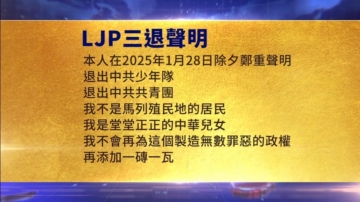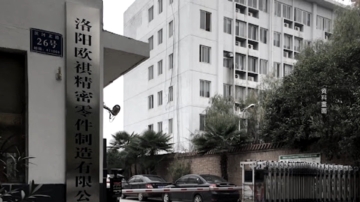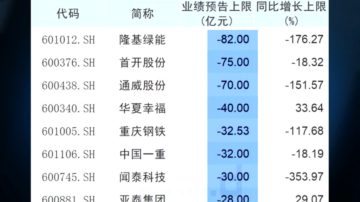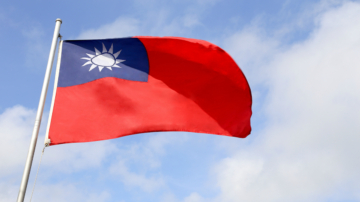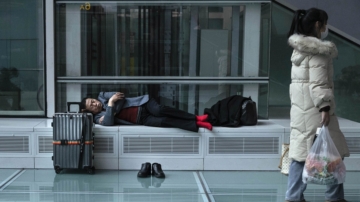【新唐人2012年8月7日讯】“斋月、封斋”是全球穆斯林古老的宗教习俗。但中共当局禁止新疆维吾尔族穆斯林封斋活动,说是为当地民众身体健康考虑,评论指出,中共对当地的打压一直在延续着,现在又利用行政手段打着为民众着想的旗号,干涉当地的宗教信仰习惯,只会激起更大的民愤。
世界各地的穆斯林每年有30天的“封斋”活动,7月20号“斋月”开始,新疆各级政府如临大敌。派遣中共官员进驻“清真寺”,在每个周四接受官方约谈,由当局规定周五的讲经内容等。
中共还在乡村、县一级组织了“斋月维稳队伍”,严查斋月集会和从事宗教活动。同时新疆各地政府网站都发出通知,严禁党员干部、职工、师生参与“封斋”等宗教活动。
新疆喀甚地区叶城县“安江买里社区在斋月期间开展党员干部茶话会”的简报上说,穆斯林开始“封斋”的时候,当地举办干部理论培训班,并提供免费午餐。拒绝吃午餐将有可能被指控为从事非法宗教活动。
中共当局声称,禁止“封斋”是对当地少数民族民众身体健康的考虑。中共喉舌《环球时报》引用新疆自治区政府发言人侯汉敏的话说,当局鼓励人们“为了工作和学习好好吃饭”,但不会强迫任何人进食。
常年在新疆乌鲁木齐做生意的张海涛表示:穆斯林“封斋”活动是宗教习惯,维吾尔人按照宗教教义,从日出到日落期间不能进食,在新疆已有上千年的历史,现在中共说为了他们身体健康,完全是为了掩盖在当地推行的宗教迫害。
新疆乌鲁木齐商人张海涛:“中共一直打着这样的旗号,你就像它一直打着为人民服务的旗号来侵犯人民的利益,对于有宗教信仰的人,他对信仰是很虔诚的,你现在利用行政手段打着为民众着想的旗号,干扰人家的宗教信仰习惯,这肯定能够激起人家的愤怒。”
张海涛指出,中共当局对宗教的管控越来越严厉。他说,穆斯林在全球各地都有,但“禁止封斋”的做法只有中国才有。
张海涛:“09年以前的时候,很多地方还是能够进行封斋的,09年以后对这个限制严了,对民族和宗教习惯限制的严一些,今年它们就对这个斋月加强了一些维稳措施,检查他们这些清真寺啊,还有维吾尔族的餐馆啊。”
新疆温宿县政府网站资料显示:“暑假及‘斋月’期间,学校领导每周联系清真寺不少于一次,及时了解师生进清真寺的情况,严禁教师、学生信教、学经,周五穆斯林礼拜日必须返校。”
新疆乌甚县“文化体育广播影视局”则要求党员干部签署《抵制非法宗教活动承诺书暨责任书》,要求对宗教氛围浓厚、妇女带面纱、青年留胡须等情况要及时上报﹔严禁斋月期间封斋。
身在新疆的“权利运动”组织发起人胡军指出,干涉和打压宗教自由是中共一贯的作法,而这种作法只会激起更大的民怒。
“权利运动”组织发起人胡军:“其实这是一种非常愚蠢的作法,容易更加激化冲突,它本身就提倡不允许行政机关的人员,(不论)是回族的,是维吾尔的,它不允许他信教,现在它如果是这样子搞的话,禁止人家封斋的话,破坏人家习俗的话,会引起更大的反弹。”
自2009年新疆7.5事件后,新疆地区加强了维稳措施。近期,新疆维吾尔自治区法院以“恐怖组织”和“煽动分裂国家罪”给20名维吾尔人定罪,判处他们多达15年的刑期。
胡军指出,中共经常用各种名义压制维吾尔人对平等和自由的追求,对当地的高压政策一直延续着,目前当地的局势非常紧张,冲突一触即发。
采访编辑/李韵 后制/李月
Is the CCP’s Ban on Muslim Lent for their Health?
Fasting during the holy month of Ramadan is an ancient
religious practice for Muslims around the world.
But the Chinese Communist Party (CCP) are prohibiting
the Xinjiang Uygur Muslims’ fasting activities,
supposedly with consideration for the physical health
of the local people.
Some critics point out that the CCP has always been
suppressing the local people.
Now the CCP even uses administrative means to interfere
with the habits of its local religious believers under
the petty excuse of caring for the people—
It will only provoke even greater public anger.
Muslims around the world have 30 days of Lent activities
each year.
With the beginning of "Ramadan" on July 20, all levels of
government in Xinjing seem to face strong enemies.
CCP officials are dispatched to be stationed in the "mosque"
and interview the people each Thursday.
What contents will be preached on Friday are decided by
the CCP authorities.
The CCP also organized teams for enforcing the ‘Ramadan
stability maintenance’ in the countryside and various counties,
holding thorough investigations into gatherings held during
the holy month of Ramadan and of the religious activities.
Meanwhile, various government websites in Xinjing have
given notice strictly prohibiting CCP members, cadres,
workers, teachers and students from participating
in Lent and other religious activities.
In the briefing of “To carry out tea party of CCP members
and cadres in Anjiang Maili communities” in Yecheng, Xinjiang,
it writes that when the Muslims began to “Lent”,
cadres’ theoretical training courses are held in the
local area with free lunches available during Ramadan.
Those refusing to eat lunch is likely to be accused of
engaging in illegal religious activities.
CCP authorities claim that the prohibition of Lent is in order
to consider the health of the local people of ethnic minority.
CCP mouthpiece, the Global Times, quoted Hou Hanmin,
spokesman for the Xinjiang Autonomous Regional
Government, saying that CCP authorities encourage people to
eat well for work and study, but not to force anyone to eat.
Zhang Haitao, who does business all year-round in Urumqi,
said, “The activities of Muslims fasting are religious practices.
According to their religious doctrine, Uighurs cannot eat from
sunrise to sunset, which has had a history of nearly one thousand years.
Now the CCP says that it is caring for the people’s health;
the CCP is covering up entirely the implementation of
religious persecution in the local area.”
[Zhang Haitao, Businessman in Urumqi, Xinjiang]
“The CCP has always been harboring excuses like this.
You can see it in the same way that they always violate
people’s interests under the banner of serving the people.
As for religious people, they are very devout to their faith;
the CCP now uses administrative means,
holding the banner of caring for their citizens,
yet interfering in people’s religious beliefs—
It will certainly arouse people’s anger.”
Zhang Haitao points out,the CCP authorities are becoming
increasingly harsh in controlling religions.
Haitao says Muslims are all around the world,
however, the banning of fasting is exercised only in China.
[Zhang Haitao]: "Before 2009, in many places,
Lent was still allowed.
After 2009, with more strict restrictions on
ethnic and religious habits.
This year, the CCP are strengthening some measures of
‘maintaining stability’;
they are checking the mosques
and the Uighur restaurants."
The government website of Wensu in Xinjiang, shows:
“During the summer holidays and Ramadan,
school leaders contact the mosques at least once a week,
aiming to keep abreast of the situation of teachers and students in the mosque.
Teachers and students are banned from believing in religions
and learning scriptures and must return to school by the Friday of the Muslim worshiping day.”
The cultural and sports radio and television
bureau of Wushi County, Xinjiang,
requires party members and cadres to sign a “Promise and
responsibility letter of resisting illegal religious activities”.
The bureau requires them to report on where
there is a strong religious atmosphere;
women with veils, and youth with beards
—Fasting is prohibited during Ramadan.
Hu Jun, sponsor of the “rights movement” organization,
is living in Xinjiang.
Hu Jun points out that the CCP intervening and
suppressing religious freedom is its consistent practice.
But this approach will only inspire even greater anger
from the public.
[Hu Jun, Sponsor of Rights Movement Organization]:
“In fact, this is a very stupid practice; it will intensify conflicts.
It’s already not allowed for the executive staff, the Hui,
and the Uygur, to believe in religions.
Now if it is in such a way of prohibiting the people from Lent,
destroying their customs, it will cause a greater rebound.”
Since July 5th 2009, more intensive measures of
‘maintaining stability’ have been carried out in Xinjiang.
Recently, the court of the Xinjiang Uygur Autonomous Region
convicted 20 Uighurs with the crime of being a "terrorist organization"
and of "inciting secession"—sentencing them
to up to 15 years in prison.
Jun Hu points out that the CCP often uses various names
to suppress the Uighurs’ quest for equality and freedom—
the high-handed policy on the local area continues.
At present, the local situation is very tense
and conflicts could break outat any time.
世界各地的穆斯林每年有30天的“封斋”活动,7月20号“斋月”开始,新疆各级政府如临大敌。派遣中共官员进驻“清真寺”,在每个周四接受官方约谈,由当局规定周五的讲经内容等。
中共还在乡村、县一级组织了“斋月维稳队伍”,严查斋月集会和从事宗教活动。同时新疆各地政府网站都发出通知,严禁党员干部、职工、师生参与“封斋”等宗教活动。
新疆喀甚地区叶城县“安江买里社区在斋月期间开展党员干部茶话会”的简报上说,穆斯林开始“封斋”的时候,当地举办干部理论培训班,并提供免费午餐。拒绝吃午餐将有可能被指控为从事非法宗教活动。
中共当局声称,禁止“封斋”是对当地少数民族民众身体健康的考虑。中共喉舌《环球时报》引用新疆自治区政府发言人侯汉敏的话说,当局鼓励人们“为了工作和学习好好吃饭”,但不会强迫任何人进食。
常年在新疆乌鲁木齐做生意的张海涛表示:穆斯林“封斋”活动是宗教习惯,维吾尔人按照宗教教义,从日出到日落期间不能进食,在新疆已有上千年的历史,现在中共说为了他们身体健康,完全是为了掩盖在当地推行的宗教迫害。
新疆乌鲁木齐商人张海涛:“中共一直打着这样的旗号,你就像它一直打着为人民服务的旗号来侵犯人民的利益,对于有宗教信仰的人,他对信仰是很虔诚的,你现在利用行政手段打着为民众着想的旗号,干扰人家的宗教信仰习惯,这肯定能够激起人家的愤怒。”
张海涛指出,中共当局对宗教的管控越来越严厉。他说,穆斯林在全球各地都有,但“禁止封斋”的做法只有中国才有。
张海涛:“09年以前的时候,很多地方还是能够进行封斋的,09年以后对这个限制严了,对民族和宗教习惯限制的严一些,今年它们就对这个斋月加强了一些维稳措施,检查他们这些清真寺啊,还有维吾尔族的餐馆啊。”
新疆温宿县政府网站资料显示:“暑假及‘斋月’期间,学校领导每周联系清真寺不少于一次,及时了解师生进清真寺的情况,严禁教师、学生信教、学经,周五穆斯林礼拜日必须返校。”
新疆乌甚县“文化体育广播影视局”则要求党员干部签署《抵制非法宗教活动承诺书暨责任书》,要求对宗教氛围浓厚、妇女带面纱、青年留胡须等情况要及时上报﹔严禁斋月期间封斋。
身在新疆的“权利运动”组织发起人胡军指出,干涉和打压宗教自由是中共一贯的作法,而这种作法只会激起更大的民怒。
“权利运动”组织发起人胡军:“其实这是一种非常愚蠢的作法,容易更加激化冲突,它本身就提倡不允许行政机关的人员,(不论)是回族的,是维吾尔的,它不允许他信教,现在它如果是这样子搞的话,禁止人家封斋的话,破坏人家习俗的话,会引起更大的反弹。”
自2009年新疆7.5事件后,新疆地区加强了维稳措施。近期,新疆维吾尔自治区法院以“恐怖组织”和“煽动分裂国家罪”给20名维吾尔人定罪,判处他们多达15年的刑期。
胡军指出,中共经常用各种名义压制维吾尔人对平等和自由的追求,对当地的高压政策一直延续着,目前当地的局势非常紧张,冲突一触即发。
采访编辑/李韵 后制/李月
Is the CCP’s Ban on Muslim Lent for their Health?
Fasting during the holy month of Ramadan is an ancient
religious practice for Muslims around the world.
But the Chinese Communist Party (CCP) are prohibiting
the Xinjiang Uygur Muslims’ fasting activities,
supposedly with consideration for the physical health
of the local people.
Some critics point out that the CCP has always been
suppressing the local people.
Now the CCP even uses administrative means to interfere
with the habits of its local religious believers under
the petty excuse of caring for the people—
It will only provoke even greater public anger.
Muslims around the world have 30 days of Lent activities
each year.
With the beginning of "Ramadan" on July 20, all levels of
government in Xinjing seem to face strong enemies.
CCP officials are dispatched to be stationed in the "mosque"
and interview the people each Thursday.
What contents will be preached on Friday are decided by
the CCP authorities.
The CCP also organized teams for enforcing the ‘Ramadan
stability maintenance’ in the countryside and various counties,
holding thorough investigations into gatherings held during
the holy month of Ramadan and of the religious activities.
Meanwhile, various government websites in Xinjing have
given notice strictly prohibiting CCP members, cadres,
workers, teachers and students from participating
in Lent and other religious activities.
In the briefing of “To carry out tea party of CCP members
and cadres in Anjiang Maili communities” in Yecheng, Xinjiang,
it writes that when the Muslims began to “Lent”,
cadres’ theoretical training courses are held in the
local area with free lunches available during Ramadan.
Those refusing to eat lunch is likely to be accused of
engaging in illegal religious activities.
CCP authorities claim that the prohibition of Lent is in order
to consider the health of the local people of ethnic minority.
CCP mouthpiece, the Global Times, quoted Hou Hanmin,
spokesman for the Xinjiang Autonomous Regional
Government, saying that CCP authorities encourage people to
eat well for work and study, but not to force anyone to eat.
Zhang Haitao, who does business all year-round in Urumqi,
said, “The activities of Muslims fasting are religious practices.
According to their religious doctrine, Uighurs cannot eat from
sunrise to sunset, which has had a history of nearly one thousand years.
Now the CCP says that it is caring for the people’s health;
the CCP is covering up entirely the implementation of
religious persecution in the local area.”
[Zhang Haitao, Businessman in Urumqi, Xinjiang]
“The CCP has always been harboring excuses like this.
You can see it in the same way that they always violate
people’s interests under the banner of serving the people.
As for religious people, they are very devout to their faith;
the CCP now uses administrative means,
holding the banner of caring for their citizens,
yet interfering in people’s religious beliefs—
It will certainly arouse people’s anger.”
Zhang Haitao points out,the CCP authorities are becoming
increasingly harsh in controlling religions.
Haitao says Muslims are all around the world,
however, the banning of fasting is exercised only in China.
[Zhang Haitao]: "Before 2009, in many places,
Lent was still allowed.
After 2009, with more strict restrictions on
ethnic and religious habits.
This year, the CCP are strengthening some measures of
‘maintaining stability’;
they are checking the mosques
and the Uighur restaurants."
The government website of Wensu in Xinjiang, shows:
“During the summer holidays and Ramadan,
school leaders contact the mosques at least once a week,
aiming to keep abreast of the situation of teachers and students in the mosque.
Teachers and students are banned from believing in religions
and learning scriptures and must return to school by the Friday of the Muslim worshiping day.”
The cultural and sports radio and television
bureau of Wushi County, Xinjiang,
requires party members and cadres to sign a “Promise and
responsibility letter of resisting illegal religious activities”.
The bureau requires them to report on where
there is a strong religious atmosphere;
women with veils, and youth with beards
—Fasting is prohibited during Ramadan.
Hu Jun, sponsor of the “rights movement” organization,
is living in Xinjiang.
Hu Jun points out that the CCP intervening and
suppressing religious freedom is its consistent practice.
But this approach will only inspire even greater anger
from the public.
[Hu Jun, Sponsor of Rights Movement Organization]:
“In fact, this is a very stupid practice; it will intensify conflicts.
It’s already not allowed for the executive staff, the Hui,
and the Uygur, to believe in religions.
Now if it is in such a way of prohibiting the people from Lent,
destroying their customs, it will cause a greater rebound.”
Since July 5th 2009, more intensive measures of
‘maintaining stability’ have been carried out in Xinjiang.
Recently, the court of the Xinjiang Uygur Autonomous Region
convicted 20 Uighurs with the crime of being a "terrorist organization"
and of "inciting secession"—sentencing them
to up to 15 years in prison.
Jun Hu points out that the CCP often uses various names
to suppress the Uighurs’ quest for equality and freedom—
the high-handed policy on the local area continues.
At present, the local situation is very tense
and conflicts could break outat any time.



